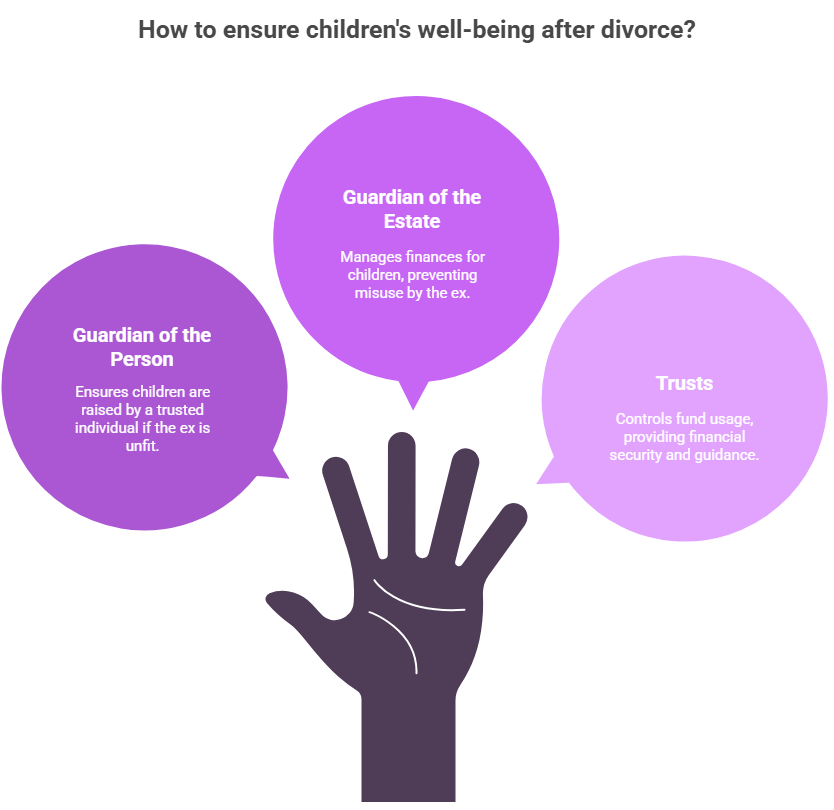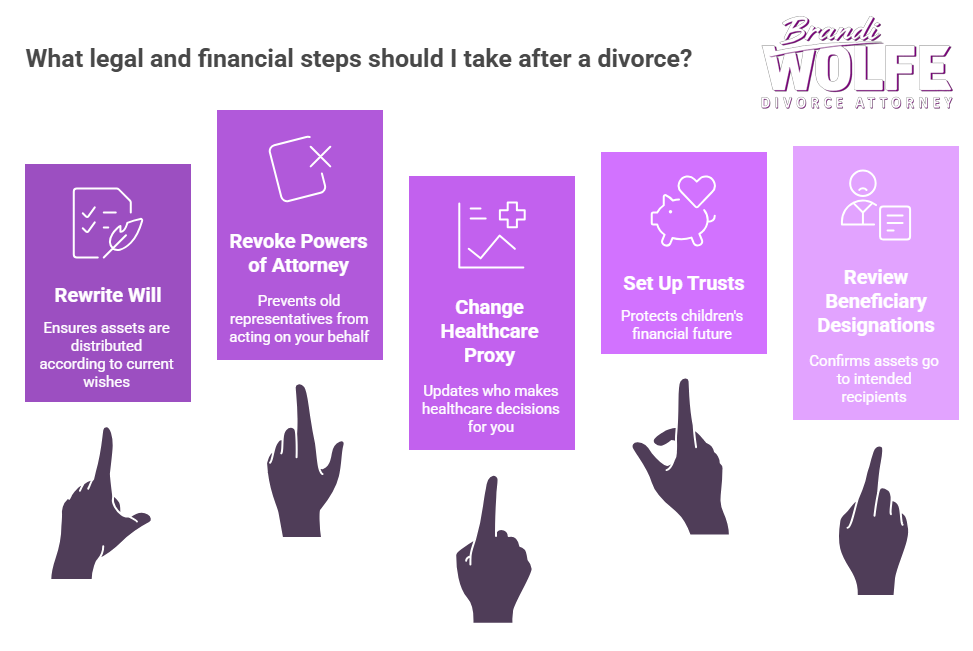How Divorce Impacts Your Estate Plan and What to Do About It
Getting divorced changes everything – your daily life, your finances, and definitely your legal documents. But here’s what a lot of people don’t realize: your estate plan doesn’t automatically update itself just because you’re no longer married.
In Texas, even after a divorce is finalized, you could still have your ex listed on your will, as your healthcare agent, or as the person who’d inherit everything if something happened to you. That’s a mess waiting to happen – and it’s totally avoidable.
If you’re in San Antonio and working through a divorce, now is the time to make sure your estate plan reflects your new reality. Brandi Wolfe helps clients protect what matters most – whether that means updating old documents, creating a new will, or making sure your ex no longer has control over your life decisions.
Why Divorce Requires an Estate Plan Review
Most people don’t think about their estate plan until something major happens – and divorce definitely qualifies. The problem is, if you don’t review and update your documents, the law might not protect you the way you think it will.

In Texas, once your divorce is final, your ex is generally treated as if they’ve died for the purposes of your will or trust. That means they usually won’t inherit under your old documents. But – and this is a big one – those protections don’t automatically apply to every part of your plan.
Your beneficiary designations on things like retirement accounts, life insurance, or bank pay-on-death accounts? Those don’t change unless you change them. And powers of attorney or healthcare directives that name your ex? They stay valid until you revoke them.
Here’s what can go wrong if you skip the update:
- Your ex could still be listed as the person in charge of making emergency medical decisions.
- Your life insurance could pay out to someone you’d rather never speak to again.
- Your ex might still have access to your finances through an old power of attorney.
This isn’t just about peace of mind – it’s about protecting your assets, your health choices, and your kids. For clients in San Antonio, Brandi Wolfe regularly reviews estate plans during or right after divorce to help avoid these exact problems.
Key Documents to Review and Revise Immediately
Once divorce is on the table – or finalized – it’s time to pull out every estate planning document and see what still makes sense. In Texas, some changes take effect automatically after a divorce, but many don’t. You can’t afford to assume the law will handle it for you.
Here’s what to look at right away:
Your Will
If your ex is still listed as the main heir, executor, or guardian of your kids, change it. Texas law treats them as “predeceased” in many cases after a divorce, but it’s safer to be crystal clear about who you want in charge now.
Trusts
Got a revocable living trust? If your ex is still the trustee or a beneficiary, it needs attention. Brandi often helps clients either revise existing trusts or create new ones – especially when kids or separate assets are involved.
Power of Attorney
This one’s urgent. If your ex still has authority to access your money or manage your property, they legally can unless you revoke it. Tear that old form up and get a new one signed.
Healthcare Directive
Still have your ex making life-or-death decisions for you? Didn’t think so. Texas advance directives don’t change just because you’re divorced. Pick someone else you trust.
Beneficiary Designations
These are often the most overlooked – and the most dangerous. Retirement accounts, life insurance, bank accounts with a “payable on death” label – all of these pass outside your will. You have to update them directly, or your ex might still be first in line.
Before vs. After Divorce Snapshot:
| Legal Item | Before Divorce | After Divorce |
|---|---|---|
| Will | Ex is likely the main heir or executor | Remove or replace them entirely |
| Trust | Shared control or benefit with ex | Amend or start fresh, especially for kids |
| Power of Attorney | Ex can manage your money legally | Revoke and assign someone new |
| Healthcare Directive | Ex decides your medical care | Reassign to someone you actually trust |
| Life Insurance & Retirement | Ex is still listed as beneficiary | Change directly with each provider |
Don’t wait. Brandi Wolfe helps San Antonio clients lock down these changes quickly and correctly – before any bad surprises show up.
Guardianship Concerns When Children Are Involved
If you have kids, this part’s not optional. Whether you’re going through a divorce or already done with it, your estate plan needs to spell out what happens to your children if something happens to you.

In Texas, courts usually favor the surviving parent when it comes to guardianship. So yes, in most cases, your ex would step in as the legal guardian if you passed away – even if you have full custody now. But there are exceptions, and you still need to have your wishes clearly documented.
Here’s what to think about:
- Guardian of the Person: This is who raises your kids if you’re gone. You can’t always block your ex from taking that role, but you can name someone else in your will as a backup or in case your ex is unfit.
- Guardian of the Estate: This is who manages the money you leave behind for your kids. Even if your ex gets physical custody, you can name someone else – like a sibling, parent, or trusted friend – to handle the finances.
- Trusts Are a Smart Move: Instead of leaving money directly to your children or through your ex, you can set up a trust that controls how and when funds are used. You choose the trustee, and they follow your rules.
Common Misunderstandings:
“I have full custody, so my ex can’t get guardianship.”
Not always true. If your ex is still alive and there’s no legal reason they can’t parent, Texas courts will likely put the kids with them unless you’ve laid out a solid alternative – and even then, the court decides.
“My will already names a guardian. Isn’t that enough?”
It’s a start, but it won’t stop the court from reviewing the situation. Still, it’s absolutely worth having your preferences on paper. Judges take them seriously, especially if there’s a clear plan and responsible person named.
Brandi Wolfe regularly updates these provisions for San Antonio families – especially when custody arrangements or co-parenting dynamics change.
Trusts, Inheritances, and Protecting Assets Post-Divorce
After a divorce, your financial picture changes – sometimes dramatically. You may now own assets separately, share property with your ex, or need to plan for your kids without involving the other parent. This is where trusts can really work in your favor.

In Texas, it’s especially important to make sure everything is clearly labeled as either separate or community property. Your estate plan should reflect this new structure so there’s no confusion or legal fight later on.
Why trusts matter after divorce:
- You stay in control. A properly written trust lets you decide who gets what and when – without court involvement.
- You keep your ex out of the loop. Don’t want them managing money you leave for your kids? A trust ensures someone else handles it.
- You protect your children’s inheritance. A trust can stagger distributions over time, rather than handing over everything at age 18.
Real-world examples Brandi Wolfe sees in San Antonio:
- Clients who inherit property from their parents and want to make sure it stays in the family – not in the hands of a future ex-in-law.
- Parents who want to leave money for their kids but don’t trust their ex to manage it wisely.
- Divorced individuals remarrying and needing to balance support for a new spouse with protections for their children from a prior marriage.
Do This / Avoid This Guide:
| Do This | Avoid This |
|---|---|
| Set up a new trust with a trusted trustee | Leaving your ex as trustee or beneficiary |
| Clearly label inherited assets as separate property | Letting them blend into community assets |
| Use staggered payouts for kids’ inheritances | Leaving lump sums to minors or teens |
| Update any old joint trusts or shared accounts | Ignoring old documents that still include your ex |
When handled the right way, trusts give you control and clarity. Brandi helps clients in San Antonio clean up old plans and set up new ones that actually match their life after divorce.
Timing, Legal Help, and Final Steps
The best time to update your estate plan? Right now. Whether you’re in the middle of a divorce or it’s already final, waiting too long can leave gaps that cost your family time, money, or worse.
In Texas, you can make certain changes as soon as the divorce is filed – like revoking powers of attorney or changing your healthcare directive. But some updates, like removing your spouse from a will or trust, are easier and cleaner once the divorce is finalized.
Here’s how to tackle it step-by-step:
- Revoke and replace powers of attorney – this can be done immediately, and it’s one of the most urgent steps.
- Update your healthcare directive – don’t leave your ex in charge of critical medical decisions.
- Rework your will and trusts – wait until the divorce is final to avoid legal conflicts, but prepare your drafts ahead of time.
- Review every beneficiary designation – this includes life insurance, retirement accounts, and any payable-on-death accounts.
- Meet with an attorney who handles both divorce and estate planning – someone like Brandi Wolfe, who understands the overlap and makes sure nothing falls through the cracks.
Having one lawyer who knows both sides – family law and estate planning – means your legal documents actually match your divorce agreement. That matters in 
Top 5 To-Dos After a Divorce in Texas:
- Rewrite your will from scratch – don’t just cross out names.
- Revoke all old powers of attorney.
- Change your healthcare proxy immediately.
- Set up new trusts for your children if needed.
- Double-check every single beneficiary designation.
FAQs about Estate Planning After Divorce in Texas
Do I really need to change my will after a divorce?
Yes. While Texas law may remove your ex from your will automatically, it won’t update who’s in charge, who gets what, or what happens to your kids. A clean, updated will avoids confusion and court battles.
What if I already finalized my divorce – can I still update everything?
Absolutely. In fact, that’s the best time to do it. Your divorce settlement is final, so your estate plan can now be updated without interference or delays.
Can I stop my ex from managing the money I leave for our kids?
Yes. You can create a trust and name someone you trust to handle the funds. That way, your kids are protected, and your ex has no access or control.
What happens to my power of attorney and health care documents?
Unless you revoke them, your ex might still legally control your finances or medical decisions. These are the first documents you should update.
Who should I name instead of my ex?
Pick someone reliable – siblings, parents, close friends – anyone who will respect your wishes and is willing to take on the responsibility.
Does Texas automatically cancel all my old documents after divorce?
No. Some changes happen automatically (like inheritance through a will), but beneficiary designations and powers of attorney do not. You have to change those yourself.
What if I’m still going through the divorce – should I wait?
No. You can update powers of attorney, health care directives, and some beneficiary designations right now. Wills and trusts are easier to finalize after the divorce, but it’s smart to prepare.
Can one lawyer help with both divorce and estate planning?
Yes. That’s exactly what Brandi Wolfe does. Her background in both areas means she can protect your rights during the divorce while setting you up for peace of mind after.
Protect What Matters Most – Contact Brandi Wolfe Today
Whether you’re just starting the divorce process or it’s already behind you, now is the time to get your estate plan in order. Brandi Wolfe helps clients across San Antonio take the right legal steps to protect their future – without the confusion or cookie-cutter advice.
Brandi handles both divorce and estate planning under one roof, so your documents reflect your real life – not just the legal paperwork. Call Brandi Wolfe Law today at (210) 571-0400 to schedule your consultation and protect what matters most.

